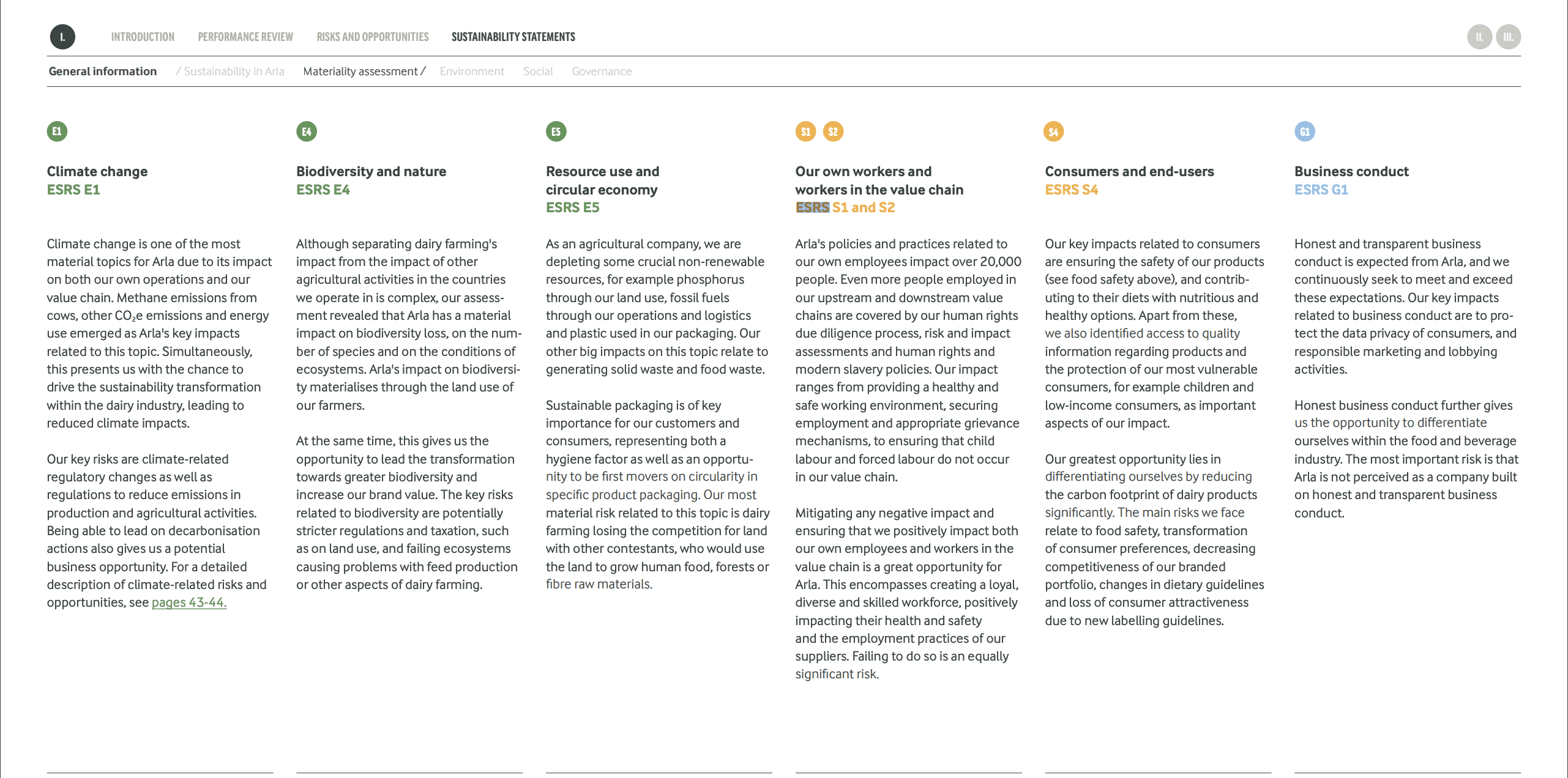Monday, November 11, 2024
Discover how the ESRS G1 standards guide companies to uphold ethical governance, focusing on areas like whistleblower protection, animal welfare, supplier relationships, and anti-corruption measures.

Maikel Fontein
Nov 11, 2024
4
min
The European Sustainability Reporting Standards (ESRS) G1 provides a detailed framework that guides organizations in establishing and disclosing their ethical and governance practices under the umbrella of "business conduct." This standard is crucial for businesses, especially in sectors like food, where transparency and ethical conduct impact consumer trust, regulatory compliance, and long-term sustainability. ESRS G1 is structured around several key areas, including corporate culture, whistleblower protection, animal welfare, political engagement, and management of supplier relationships, with comprehensive guidance found from pages 240-247.
G1: Business Conduct
Subtopics G1
Protection of Whistleblowers
Animal Welfare
Political Engagement
Supplier Relationships and Payment Practices
Corruption and bribery
Objectives for Companies: Business Conduct
Whistleblower protection: Whistleblower protection is a vital part of ESRS G1, requiring companies to maintain confidential channels for employees to report unethical or unlawful behavior. ESRS G1 specifies that organizations must provide training for staff receiving whistleblower reports, as well as protection measures against retaliation for employees who report misconduct, as aligned with Directive (EU) 2019/1937. For example, a dairy cooperative might establish an external hotline where employees can report unethical practices, ensuring that concerns about supply chain practices, such as unfair pricing, are addressed transparently and without fear of retaliation.
Animal Welfare: ESRS G1 includes animal welfare as an area of corporate conduct, requiring companies in industries like food and agriculture to disclose policies and practices in place to ensure ethical treatment of animals in their operations. This is particularly relevant for companies involved in meat or dairy production, where maintaining high animal welfare standards is both an ethical and regulatory priority.
Political engagement and lobbying activities: Transparency in political engagement is also emphasized in ESRS G1. Organizations must disclose any financial or in-kind contributions to political entities, including the nature and scope of their lobbying activities. This requirement helps stakeholders understand how a company’s political engagements align with its sustainability objectives. For example, a beverage company may participate in lobbying efforts for stricter food safety regulations while disclosing these activities in sustainability reports. Such transparency reinforces the company’s commitment to responsible business practices.
Management of relationships with suppliers, including payment practices: Effective management of supplier relationships, especially payment practices, is another essential area under ESRS G1. The standard mandates that companies disclose their approach to fair payment, particularly to SMEs, and how they handle risks and sustainability impacts within their supply chain. This includes setting and communicating clear payment terms, avoiding late payments, and evaluating supplier practices for social and environmental compliance. For instance, a snack manufacturer could ensure timely payments to small farmers, supporting local economies and fostering a responsible supply chain. Regular audits and partnerships with certified suppliers can further enhance the company’s commitment to ethical sourcing.
Corruption and Bribery: Under ESRS G1, companies are required to establish rigorous anti-corruption and anti-bribery procedures to prevent, detect, and address unethical practices. This includes implementing internal controls, conducting independent investigations, and setting up clear response systems. In the food industry, where companies frequently interact with suppliers, transparency in procurement processes is essential. For instance, a food producer might prohibit gift-giving from suppliers and establish a transparent, merit-based supplier selection process. By pairing these measures with regular anti-corruption training tailored to high-risk functions, the company reinforces its commitment to ethical standards and reduces exposure to bribery risks.
Sub sub topic of Corruption and bribery
Prevention and Detection, Including Training
Incident Reporting and Transparency
Objectives for companies: Corruption and bribery
Prevention and Detection, Including Training: ESRS G1 requires companies to establish systems for preventing and detecting corruption and bribery, especially in high-risk areas. These systems often include regular training for employees in functions susceptible to unethical behavior, like procurement or sales. For example, a global food producer could conduct annual workshops for procurement staff, focusing on how to recognize and avoid bribery attempts during supplier negotiations. Such training not only reinforces ethical behavior but also gives employees the tools to navigate complex situations. Additionally, companies may implement clear protocols for handling gifts or incentives, reminding employees to report any offers that could potentially lead to a conflict of interest.
Incident Reporting and Transparency: Transparency around incidents of corruption and bribery is another key component of ESRS G1. Companies are required to report the total number of incidents and detail the steps taken to address each case. For instance, a dairy company could disclose the number of corruption incidents identified during the year and explain any corrective actions, such as employee terminations or revised supplier agreements. By openly addressing these breaches, the company demonstrates accountability and a commitment to ethical standards. This level of transparency builds stakeholder trust, showing that the organization is proactive about maintaining an ethical work environment and upholding high standards in its operations.
Real world Examples of companies
To see how ESRS G1 can guide ethical governance in practice, let's examine how two major food companies, Arla and Lotus Bakeries, have integrated these standards into their operations. Both companies showcase different facets of business conduct under ESRS G1, highlighting areas like transparency, ethical sourcing, consumer trust, and risk management.
Arla

Arla’s governance approach emphasizes transparent business conduct, focusing on consumer data privacy and responsible marketing and lobbying. By upholding high ethical standards, Arla aims to differentiate itself in the food industry, ensuring it is seen as a trustworthy and transparent company. The primary risk identified is the potential loss of reputation if Arla is perceived as lacking in transparency.
Lotus Bakeries

For Lotus Bakeries, ESRS G1 (Corporate Governance) emphasizes financial stability and resilience through a focus on long-term strategic planning, robust cybersecurity measures, and proactive steps to prevent business interruptions. By prioritizing sustainable growth, protecting digital assets, and minimizing risks that could disrupt operations, Lotus Bakeries strengthens its commitment to ethical management and transparency.
Conclusion
Implementing ESRS G1 standards provides companies with a structured approach to uphold ethical business conduct, which is increasingly vital for consumer trust and regulatory compliance, particularly in sensitive sectors like food. By focusing on areas such as whistleblower protection, animal welfare, political engagement, supplier relationships, and anti-corruption practices, companies not only fulfill regulatory obligations but also strengthen their brand reputation and sustainability goals. In doing so, they position themselves as transparent, responsible players in the market, which can lead to long-term growth and trust-building with stakeholders.



